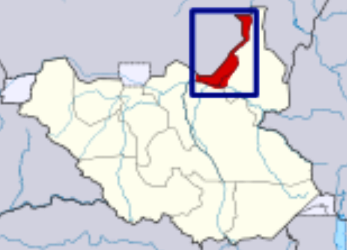South Sudan’s ethnic Shilluk overthrew king over 28 states
January 16, 2016 (JUBA) – The Shilluk ethnic group in South Sudan has overthrown their long serving king, Kwongo Dak Padiet, accusing him of supporting the creation of 28 states and over staying in the national capital, Juba, in negligent to the concerns of the Shilluk kingdom at home in the oil rich Upper Nile state.

“On Wednesday 13th January 2016, a prince from the kingship Lineage of Kur Fafiti overran Fashoda, the Headquarters of Shilluk Kingdom. The police guards and the Chief who were guarding the traditional palace surrendered and allowed the new prince and his guards to occupy Fachoda,” declared the statement extended to Sudan Tribune.
“It was expected that king Kwong would come public to oppose the annexation and division of the Kingdom and pushing all the Shilluk people to western side of the Nile. Instead, the dethroned King went public, saying that he cannot go against the government decision because the king is supposed to work with government leadership.”
The new king, whose name is not made public, backed by the strong armed opposition commander, General Johnson Olony, is now the new king of the Shilluk kingdom and his priority is to defend the Shilluk land against the 28 states.
The statement further argued that the decision to overthrow the king was taken because the former King Kwongo decided to avoid going to live in Shilluk Kingdom and address their concerns over the annexation of their lands as he preferred to stay in Juba under protection of president Kiir’s government.
“This is happening because the Shilluk’s leadership customs doesn’t allow absence of the king from soil of the kingdom for a long period as this could open gaps for bad luck to the people with the spirit of founder Nyikango and other ancestors deserting the land. The dethroned King Kwongo Dak Padiet has [been] absenting himself from Fachoda for about two years since 2013,” says the statement.
They said he sometimes visited the kingdom on a government’s mission which usually took half a day and he returned to Juba.
The Shilluk, it said, were not comfortable with the situation of his absence for two years, but added “this was made worst by the President Kiir Executive Order 36/2015 which annexed the Shilluk lands east of the Nile and Sobat rivers to the Apadang Dinka areas under East Nile State with capital in Malakal.”
The reaction of the Shilluk people in general, according to the statement, seems to be in approval of dethroning of King Kwongo.
The new development took place on the same day the head of South Sudan’s Joint Monitoring and Evaluation Commission (JMEC), Festus G. Mogae, visited Malakal during which he was engaged in a hard talk with over 40,000 members of the Shilluk internally displaced persons (IDPs) in the United Nations protection of civilians camp in the state capital who welcomed him with posters rejecting 28 states.
The overthrow of their king, according to observers, was a strong message to Mogae in show of strong opposition to the 28 states.
Shilluk women reportedly promised Mogae that they will be ready to reclaim their rights over the annexed lands with their own power if the joint monitoring and evaluation doesn’t stop the annexation.
The women, according to the statement, gave the head of peace monitoring commission all the legal and historical documents of Shilluk boundaries as of 1 January 1956 with expectation that these will be included in his report to African Union Summit in Addis Ababa as the organization’s Charter is in line with the maintenance of colonial borders between tribes in Africa.
The Shilluk is one of the ethnic groups in South Sudan dissatisfied with the presidential order creating more administrative units widely seen by the community as akin to what happened during the Mahadiah era in the Sudan where attempts were made to annex the historic kingdom and islamize it together with Funj and Fur Kingdoms.
The Mahadists expansion was however resisted and the historic kingdom with all its borders remained intact.
However, other communities such as the Nuer, the second largest, have been threatening to reclaim their ancestral lands by all means should president Kiir insist on maintaining the 28 states he created unilaterally.
Almost all the major Nuer communities in Unity, Upper Nile and Jonglei have been affected by the 28 states as their lands have been annexed to their neighbouring Dinka communities of Parieng, Abiemnhom in Unity state, Apadang of Upper Nile and greater Dinka Bor community of Jonglei states.
(ST)
